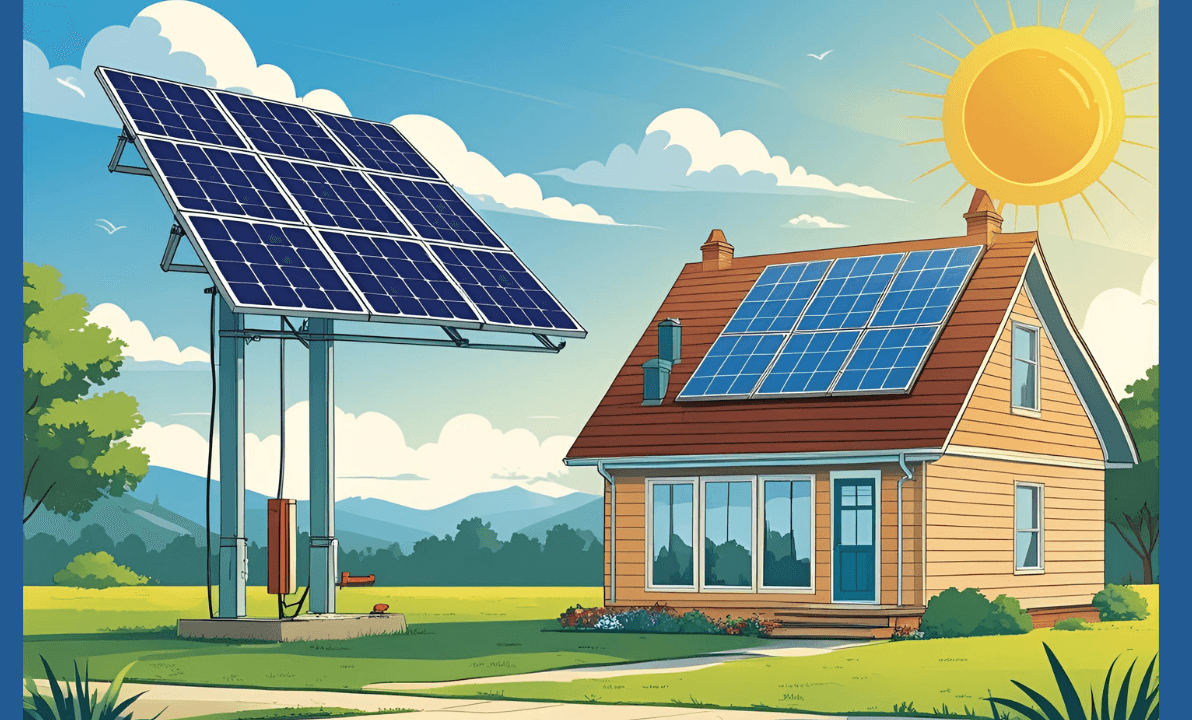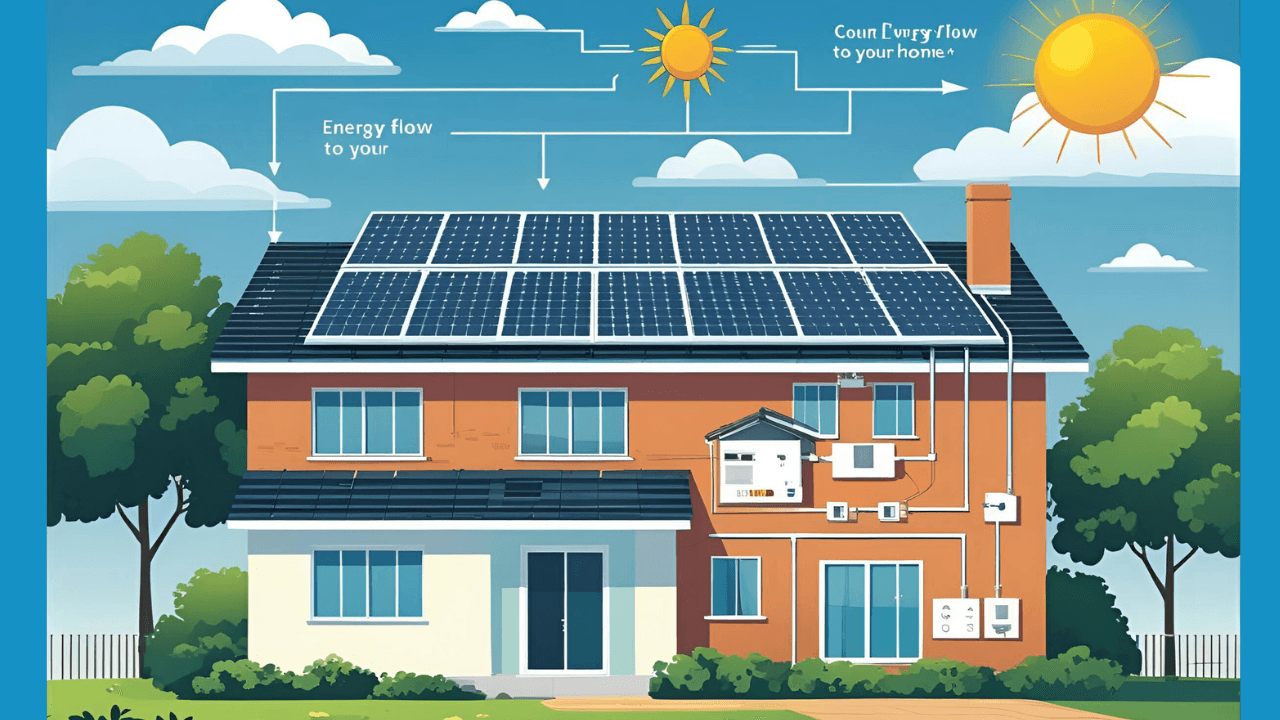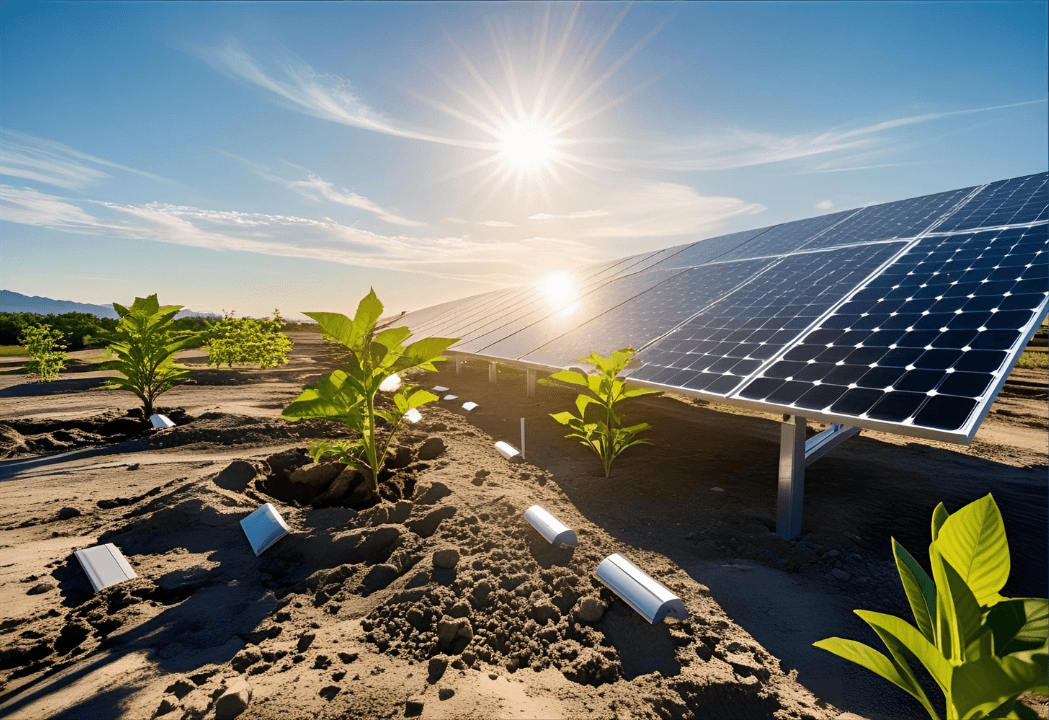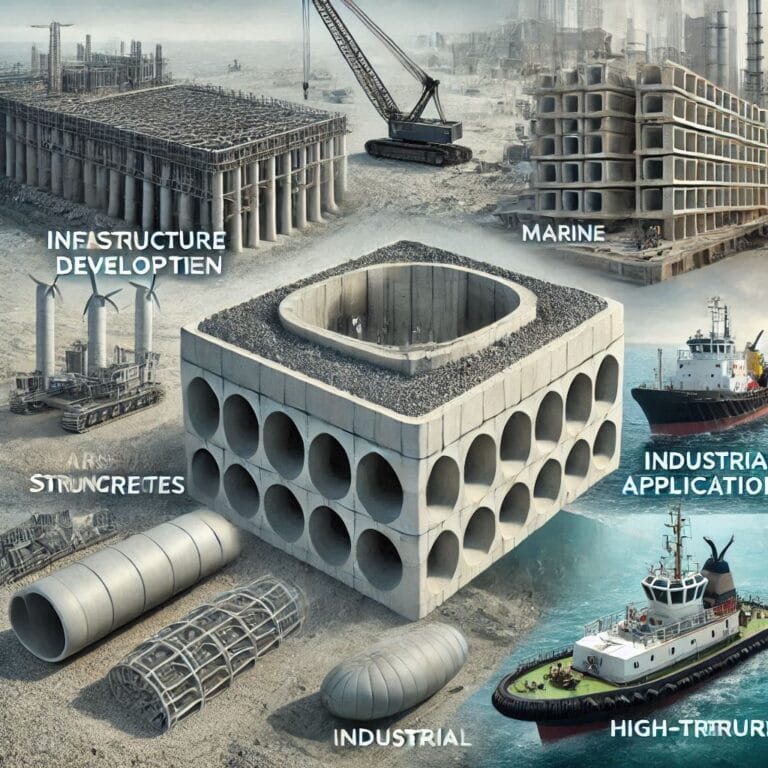🧱 Introduction
With the growing demand for clean and sustainable energy, more homeowners and businesses are considering solar solutions. Whether it’s powering a small home or a large factory, two main options exist: rooftop solar plants and ground-mounted solar systems.
In this blog, we dive into a detailed solar plant installation comparison to help you understand the pros, cons, and key performance differences. If you’re wondering whether to go for a rooftop setup or place panels on open land, this guide will help you decide between a ground-mounted vs rooftop solar plant.

🧱 What Is a Rooftop Solar Plant?
A rooftop solar plant is installed directly on the roof of a residential, commercial, or industrial building. These systems can be grid-tied, off-grid, or hybrid, depending on the energy needs and local utility policies.
They are especially ideal for urban and semi-urban areas where land is limited but rooftop access is available.
✅ Rooftop Solar Plant Advantages
- Makes use of otherwise unused rooftop space
- Requires no additional land
- Faster and less complex installation
- Enhances property aesthetics, especially for homes
❌ Limitations
- Panel size and capacity are limited by available roof area
- Some roofs may need structural reinforcement
- Cleaning and maintenance can be challenging at heights
Overall, a solar panel on roof solution is excellent for individual buildings looking to reduce electricity bills without large upfront land investments.

🧱 What Is a Ground-Mounted Solar Plant?
A ground-mounted solar plant is installed on open land—either adjacent to a building or within a dedicated solar farm. These systems use mounting structures to support the panels, which can be either fixed-tilt or equipped with sun-tracking mechanisms for improved efficiency.
This type of system is commonly used in industrial, institutional, or rural settings where space is not a constraint and large-scale energy production is needed.
✅ Ground Solar Plant Benefits
- Flexible in design, allowing optimal orientation and tilt
- Easier access for cleaning, repairs, and upgrades
- Scalable for high energy demands such as factories, schools, or solar parks
❌ Challenges
- Requires significant open land, which may not be available in urban settings
- Involves higher upfront investment due to civil structures, mounting frames, trenching, and cabling
- Needs fencing or surveillance for security in open areas
While the ground-mounted solar system cost is higher compared to rooftop systems, the increased efficiency and scalability make it worthwhile for commercial or large-scale users.

🧱 Key Differences: Rooftop vs Ground-Mounted Solar
Let’s break down the key features to help you decide between a rooftop solar and ground-mounted solar setup:
| Feature | Rooftop Solar | Ground-Mounted Solar |
|---|---|---|
| Space Requirement | Utilizes existing rooftop space | Requires dedicated land area |
| Installation Time | Faster: 1–3 days for residential setups | Slower: 5–15 days depending on project scale |
| Cost | Lower cost due to existing infrastructure | Higher cost (mounts, trenching, land prep, etc.) |
| Maintenance | Slightly harder due to roof access | Easier and safer due to ground-level access |
| Efficiency | Depends on roof angle and shading | Optimized with adjustable tilt and tracking systems |
| Best For | Homes, offices, shops | Factories, schools, farms, and industrial consumers |
This solar plant installation comparison clearly shows that the best type of solar plant for home or business depends on your space, budget, and energy goals. For smaller setups, rooftops offer quick deployment and cost savings. For high-demand installations, ground-mounted vs rooftop solar systems often favor ground setups for performance and scale.
🧱 Performance & Efficiency Factors
The performance and efficiency of a solar plant depend heavily on its orientation, angle, and exposure to sunlight.
- Ground-mounted solar systems can be strategically placed to face the sun at the ideal tilt and direction, ensuring maximum sunlight capture throughout the day.
- Many large-scale setups also include solar tracking systems that follow the sun’s movement, boosting energy output by 10–25% depending on location and technology used.
- Rooftop solar plants, on the other hand, are often limited by the roof’s angle, shading from nearby buildings, trees, or water tanks, and the direction the roof faces.
Despite these challenges, rooftop systems can still deliver great output with proper design and installation.
This solar plant efficiency comparison shows that solar power output tends to be higher and more consistent in ground-mounted systems, especially when trackers are used.
🧱 Cost Comparison: Rooftop vs Ground-Mounted
Let’s look at the cost breakdown of rooftop vs ground-mounted solar plants in both Indian and U.S. markets.
🏠 Rooftop Solar Cost:
- India (5 kW system): ₹2.3 lakh to ₹3 lakh
- USA (5 kW system): $6,000 to $8,000
- Benefits: Lower cost, quick ROI, no land needed
🏞️ Ground-Mounted Solar Cost:
- India (10 kW+ system): ₹6 lakh to ₹12 lakh+
- USA (10 kW+ system): $15,000 and above
- Additional expenses: Land leveling, support structures, trenching, and fencing
While solar system cost in India and USA is lower for rooftop setups, the return on investment (rooftop vs ground-mounted ROI) can be better with ground-mounted systems for large-scale, high-output applications. The key is matching system type to your budget, space, and energy goals.
🧱 Which One Should You Choose?
When deciding between a ground-mounted vs rooftop solar system, the right choice depends on your unique needs, property type, and energy goals. Here’s a quick decision guide:
✅ Choose a Rooftop Solar Plant If:
- You have limited space but want to reduce electricity bills
- You’re looking for faster and low-cost solar plant installation
- You’re a homeowner, shop owner, or small business with roof access
- You want to take advantage of rooftop solar plant advantages like aesthetics and easy grid integration
✅ Choose a Ground-Mounted Solar System If:
- You need higher power output for factories, institutions, or farms
- You own land or operate on large premises
- You want flexibility in panel orientation, scalability, and ease of maintenance
- You’re evaluating ground-mounted solar system cost as a long-term investment
💡 Pro Tip: Some industries install both types to optimize space, cost, and output — a smart hybrid solution!
🧱 Conclusion
There’s no one-size-fits-all answer when choosing between a rooftop and ground-mounted solar plant. The best type of solar plant for home or business depends on:
- Available space
- Budget and long-term ROI goals
- Energy consumption patterns
- Local regulations and subsidy availability
Before making a decision, get a professional site assessment to compare the options with real data. Consider tools like net metering, government incentives, and export tariffs to maximize savings.
Explore More on Solar Energy:
-
Beginner’s Guide to Solar for Factories & Industrial Rooftops
Uncover how industrial setups can slash electricity costs and embrace energy independence with smart solar planning. -
DualSun Hybrid Panels: 2-in-1 Energy Solution
Learn about the groundbreaking panels that deliver both electricity and thermal energy from a single compact unit. -
Solar Plant Cost in 2025: How Much Does a 5kW, 10kW, or 100kW Solar System Really Cost?
Get a detailed breakdown of system pricing, ROI, and installation factors for various solar capacities in today’s market. -
What Is a Residential Solar Plant and How Does It Power Your Home?
Dive into how rooftop solar works for households, what components are needed, and how much energy you can actually generate. -
Commercial Solar Plant vs Industrial and Residential: Key Differences Explained
Understand the unique features, benefits, and use-cases of commercial solar plants compared to industrial and residential systems.






